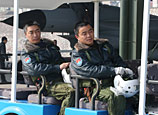
Key Words:Barack Obama;China;Japan;U.S. presidential election;oath;Capitol;inauguration;win-win strategy;
Related Reading:
>> New aspects in US Asia-Pacific strategy
>> Obama could build a legacy by boosting trust with China
>> U.S. sends wrong signal over Diaoyu Islands issue
>> US' dangerous stance
US President Barack Obama began his second term on Sunday, with daunting tasks facing him both at home and abroad. Some believe Obama, now more confident, may be emboldened to take a harder line on foreign policies. However, when it comes to Sino-US relations, caution and a win-win strategy would be more pertinent.
During his first presidential term, economic and people-to-people ties between China and the United States deepened thanks to the efforts from both sides. But owing to his administration's penchant for unilateral actions and disregard of China's core interests and major concerns, Obama has failed to enhance the strategic trust between the two nations, which has led to more strategic distrust.
Washington's strategic rebalancing to the Asia-Pacific has considerably complicated the territorial disputes in both the East and South China seas, resulting in clear and present threats to China's core national interests.
With the US' backing, countries like Japan and the Philippines have resorted to one reckless move after another to challenge Chinese maritime sovereignty, raising tensions in the region. China has made clear it welcomes the US playing a constructive role in the region. Yet the US' actions have been the opposite. Obama needs to match words with deeds.
Good bilateral ties are not just in China's interests. Washington should know it has nothing to win if ties go sour. For the ultimate good of his own country, Obama should take a long-term and global perspective on bilateral ties and refrain from making hotheaded remarks and unilateral moves that may choke the favorable atmosphere for bilateral interaction.
It has become an international consensus that Sino-US ties are now the most important and complicated pair of nation-to-nation ties in the world. Proper handling of the ties not only caters to the interests of the two countries but also has a significant bearing on the world as a whole.
China has proposed to build a new type of relationship between Beijing and Washington, based on win-win cooperation, mutual trust and meaningful interaction. It has called for both sides to inject positive energy into their cooperation. This indicates Beijing is determined to keep bilateral ties on stable terrain and transform the historical pattern in which conflict between a rising power and an established one appeared inevitable.
With a fresh four-year term ahead, Obama has an opportunity to bring strategic visions to his China policy so that the two countries work together for their lasting peace and prosperity, and that of the world at large.
















 This is the most real, most helpless and most motivate life expense of Beijing!
This is the most real, most helpless and most motivate life expense of Beijing!


![]()
